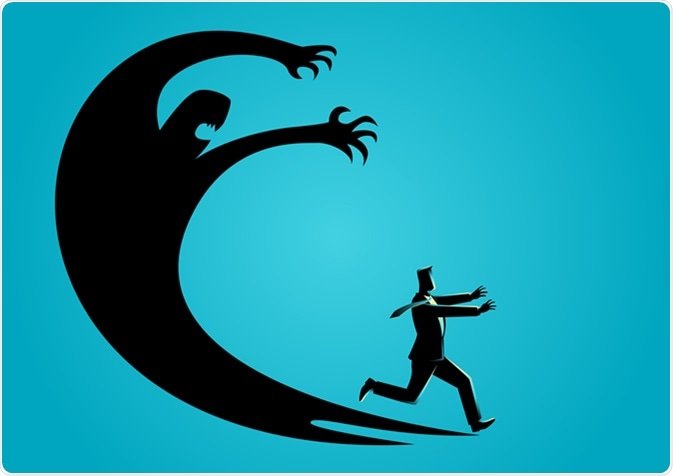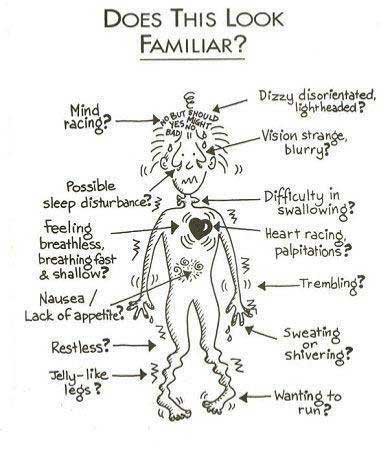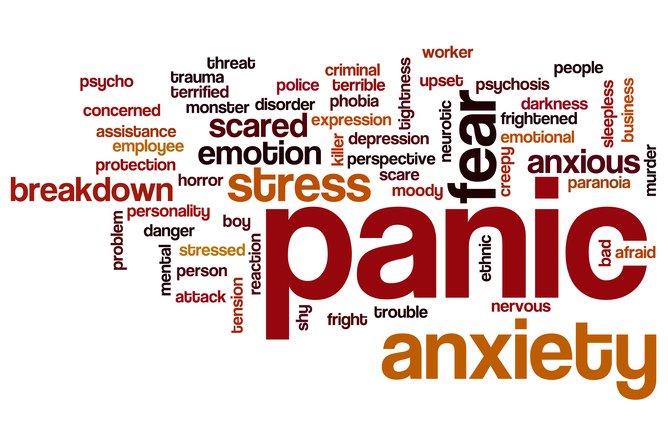Anxiety a monster that lives inside you
Hello friends, today is a day of darkness and I want to talk about a disorder called Anxiety

When we expose ourselves to a danger or a threat, anxiety acts as an alert system that allows us to take measures to face the danger. This is something natural and beneficial because anxiety acts as a friend that helps preserve your life; This type of reaction is called by some authors as adaptive anxiety. But when anxiety grows and becomes part of your life, it can transform into a monster that feeds on your fear and generates so much suffering that it can become incapacitating.
An anxiety disorder is when a person has an uncontrollable feeling that he should not go outside that something bad is going to happen, that he is going to have a heart attack or that he is sick and even feel someone in their head that he is going crazy.

Anxiety disorders are the most common mental health condition in the United States. Approximately 40 million adults in the US have symptoms before age 21 and women are 60% more likely to suffer from this disorder than men.
Symptoms can be:
• Physical: tachycardia, shortness of breath, tremors, sweating, nausea, vomiting, motor difficulty, dizziness among others.
• Psychological and behavioral: restlessness, overwhelm, feeling of threat or danger, desire to flee or attack, insecurity, feeling of emptiness, feeling of strangeness or depersonalization, fear of losing control, suspicion, suspicion, uncertainty, difficulty in making decisions. In more extreme cases, fear of death, madness, or suicide
• Cognitive: Difficulty of attention, concentration and memory, increase of the shortcomings and carelessness, excessive worry, negative expectations, rumination, distorted and unwanted thoughts, increase in doubts and confusion, tendency to remember especially unpleasant things, overestimate small unfavorable details, abuse of prevention and suspicion, inadequate interpretations, susceptibility, etc.
• Social: difficulty expressing oneself, irritability and self-absorption.
Many studies have been conducted, but scientists have not been able to define a cause for this disorder. However, they consider that there are a series of factors that can influence their appearance as hereditary, the environment in which they live, traumatic events, suffering too much stress, living radical changes, etc.
Different anxiety disorders have different symptoms. This means that each type of anxiety disorder has its own treatment plan.

The most common anxiety disorders are:
• Generalized anxiety disorder: produces a chronic and exaggerated concern for daily life. It can occur for hours, every day, making it difficult to concentrate or complete daily tasks
• Panic Disorders: Characterized by panic attacks; that is, sudden feelings of fear, which sometimes occur repeatedly and without warning. Panic attacks, which are often mistaken for heart attacks, cause strong physical symptoms; for example, back pain, heart palpitations, dizziness, shortness of breath and upset stomach.
• Obsessive-compulsive disorder: these are anxious thoughts or ideas that can influence our behavior.
• Phobias: fear focuses on a particular situation, object or activity.
• Post-traumatic stress: the trigger of this type of anxiety, is having lived some traumatic situation in childhood and is repressed.

Diagnosis
The physical symptoms of an anxiety disorder can easily be confused with other medical conditions, for example, heart conditions or hyperthyroidism. Therefore, a doctor will probably conduct studies that involve physical exams, a medical interview, and laboratory tests. After ruling out a physical condition, the doctor may recommend that the person see a mental health professional to make a diagnosis.

Treatment
Because each anxiety disorder has a different set of symptoms, the types of treatment that a mental health professional recommends can vary. Psychotherapy and medications are usually used.

How to prevent it?
To prevent and combat anxiety, it is important to lead a healthy lifestyle, practice outdoor exercise to clear your mind, perform activities that enjoy filling your heart, enjoy your affections, share your worries and feel good about yourself.
Philippians 4:6-7 New Living Translation (NLT)
Don’t worry about anything; instead, pray about everything. Tell God what you need, and thank him for all he has done. 7 Then you will experience God’s peace, which exceeds anything we can understand. His peace will guard your hearts and minds as you live in Christ Jesus.
• Sunday - Light
• Monday - Darkness
• Tuesday - Animal Kingdom
• Wednesday - Structures
• Thursday - Forces in Nature
• Friday - LoveBeauty Freedom
• Saturday - AgricultureThanks to @sirknight for the #celestialchallenge.
Source
https://clinicadeansiedad.com/soluciones-y-recursos/preguntas-mas-frecuentes/cuales-son-los-sintomas-de-la-ansiedad/
https://www.nami.org/Find-Support/Diverse-Communities/Latino-Mental-Health/La-salud-mental-en-la-comunidad-latina-/Trastornos-de-ansiedad
Hi! I am a robot. I just upvoted you! I found similar content that readers might be interested in:
https://www.nami.org/Learn-More/Mental-Health-Conditions/Anxiety-Disorders
Our worst fears and barriers that limit us are our inmates. Many times we just do or say something for fear of failure or to make mistakes. We all have that feeling at some point in our lives.
Anxiety is defined as:
Mental state characterized by great restlessness, intense excitement and extreme insecurity.
Anguish that accompanies some diseases, especially certain neuroses.
https://www.google.co.za/search?q=that+is+the+sciousness&oq=that+is+the+sciousness&aqs=chrome..69i57j0l5.20983j1j8&sourceid=chrome&ie=UTF-8
Anxiety can manifest itself in many aspects, anger, joy, fears, frustrations. It is important to be able to have self-control so that all these fears do not dominate us from within and take us out of our center, thus unbalancing our inner peace.